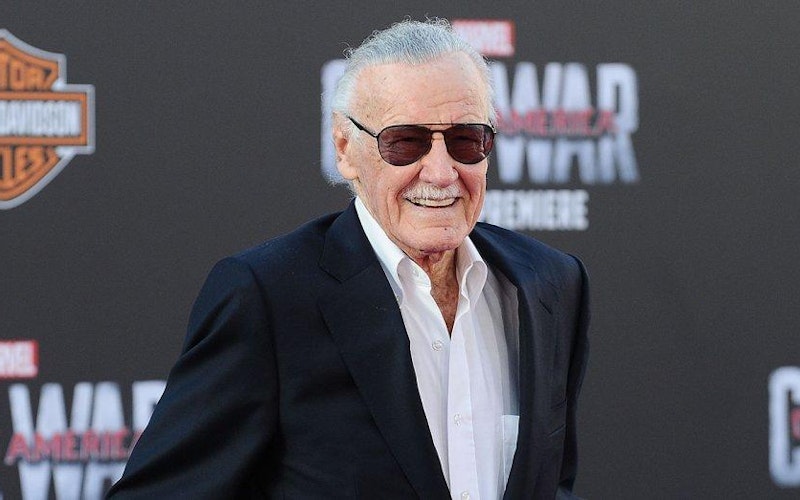
Culture At Large
Finding Humanity in Stan Lee's Modern Mythology
Creator, writer, and former-chairperson of Marvel Comics Stan Lee died earlier this week at the age of 95. The sheer variety of people who have paid tribute to Lee speaks to the vast influence of his characters and worlds. Comic creators like Tom King and Kelly Sue Deconnick are to be expected, as are the stars of the more than thirty (and still counting!) films based on Marvel characters―Ryan Reynolds, Hugh Jackman, Tom Holland, Chris Pratt, Angela Bassett, and more. But so did the kids of Stranger Things. And Dwayne "the Rock" Johnson, Neil deGrasse Tyson, and Paul McCartney. And on and on, all saying some version of the same thing: "Thank you for making a place for me."
Comic books are modern mythology. They show us a world at once like ours and unlike ours, a world ordinary and extraordinary. Natural and supernatural. And what made Stan's characters stand apart from the Detective Comics characters who had reigned supreme before he made his mark on the genre (Batman, Superman, Wonder Woman, and their super-friends) was how ordinary they were.
The Fantastic Four were, at their heart, a family trying to live together. Spider-man was a teenage kid whose superpowers were just one more adolescent impossibility to balance. The X-Men were kids who didn't fit in, but worked for the good of the people who hated them anyway. The Hulk was a brilliant guy who turned into an uncontrollable rage-monster. Iron Man was a brilliant guy with an addiction he couldn't kick. Black Widow had a past she couldn't face.
It's impossible not to see ourselves in these characters. Their stories helped many of us to feel less alone, to feel a little less weird, and to believe that no matter how dark the night, day was coming if we'd only hang on―or maybe buy next month's issue. While the superpowers got us to open the book, it was the humanity of Lee’s characters that kept us turning the pages.
Christians could take a page from Lee's storytelling genius. He didn't shy away from real humanity in his stories (in 1971, he famously faced down the overbearing Comics Code Authority in order to employ realistic depiction of the harmful effects of drug abuse).
Lee's characters, flaws and all, created space for people who felt as though they were on the margins.
Too often, especially when telling the stories of Scripture to teens and kids, we whitewash the characters’ stories. Abraham is a model of faith. Jacob worked hard and didn't let a little bad luck stop him. Gideon was a faithful general. Samson, a strong man who got distracted. David was a man after God's own heart and Peter, the rock on which the Church was built.
But Abraham also lied about Sarah being his wife―twice―and brought judgment on foreign kings (Genesis 12:10-20 and 20. Jacob lied, cheated, and burned every bridge he ever had (Genesis 27:41 and 31:51-53). Gideon's famous fleece moment was a marked lack of faith in God's promise (Judges 6:36-40; why do we encourage people to put out fleeces, again?). Samson was the villain of Judges 13-16, barely different from the Philistines he was supposed to judge. David was a selfish, self-centered king who's in the running for worst dad in the Bible (2 Samuel 15, for instance). Peter denied he knew Jesus (Mark 14:66-72).
We could go on and on. The point is not that all our Biblical heroes were evil, but that they were human, and we do ourselves no favors by ignoring their sins and flaws in favor of hagiography. Lee's characters, flaws and all, created space for people who felt as though they were on the margins, and Lee himself spoke out unapologetically against racism and white supremacy. This, too, harkens back to Scripture, to the younger brothers and freed slaves and Samaritan and Canaanite women welcomed into the people of God.
The Apostle Paul, who called himself the chief sinner, insisted the power of God is made visible not in our strengths but in our weaknesses (2 Corinthians 12:9). Lee's characters can fall back on their superpowers to save them. (In that way, they're quintessentially American myths. They come with quite the bootstraps by which to pull themselves up.) As followers of Jesus, we trust not in our own strengths, however super they might be, but in the power of the same Spirit that raised Jesus from the dead.
In Lee's passing, we find a reminder that human characters are the most super of all, and that stories are a significant way we learn to find where we belong. As we remember Stan Lee, may we not be afraid of the whole stories God has given us. May we remember that the weakness of our humanity is where we learn to see the glory of God.
Topics: Culture At Large, Arts & Leisure, Entertainment